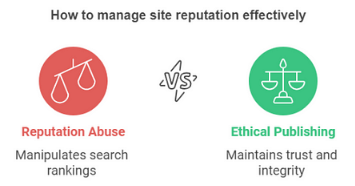Whether you do it or work with a third-party content provider, if it’s not related to your site’s core mission, you’re at risk.
“Site reputation abuse is the practice of publishing third-party pages on a site in an attempt to abuse search rankings by taking advantage of the host site’s ranking signals.” — Google

So, if you’re a new site and you have a deal with a coupon company from a third party, that’s now a no-no.
“Since launching the policy, we’ve reviewed situations where there might be varying degrees of first-party involvement, such as cooperation with white-label services, licensing agreements, partial ownership agreements, and other complex business arrangements. Our evaluation of numerous cases has shown that no amount of first-party involvement alters the fundamental third-party nature of the content or the unfair, exploitative nature of attempting to take advantage of the host’s sites ranking signals,” said a blog post in Google Search Central Blog.
Subsections meeting this criteria will be ranked as standalone sites to better level the playing field. In other words, sub-sections will not get a ranking boost because of the main site’s reputation. Google recommends that this type of content should be excluded from Search indexing.
“We encourage site owners to familiarize themselves with this updated policy and focus on building high-quality websites that prioritize content created to benefit people, not to gain search engine rankings,” said Google.

According to Google Search Central, examples of site reputation abuse: what’s allowed and not allowed.
Considered Site Reputation Abuse
· An educational site hosting a page about reviews of payday loans written by a third party that distributes the same page to other sites across the web, with the main purpose of manipulating search rankings
· A medical site hosting a third-party page about best casinos that’s designed primarily to manipulate search rankings by taking advantage of the medical site’s ranking signals
· A movie review site hosting third-party pages about topics that would be confusing to users to find on a movie review site (such as “ways to buy followers on social media sites”)
· A sports site hosting a page written by a third party about “workout supplement reviews,” where the main purpose of hosting the page is to manipulate search rankings
Allowed/Not Site Reputation Abuse
· Wire service or press release service sites
· News publications that have syndicated news content from other news publications
· Sites designed to allow user-generated content, such as a forum website or comment sections
· Columns, opinion pieces, articles, and other work of an editorial nature
· Third-party content (for example, “advertorial” or “native advertising” type pages) where the purpose is to share content directly to readers (such as through promotion within the publication itself), rather than hosting the content to manipulate search rankings
· Embedding third-party ad units throughout a page or using affiliate links throughout a page, with links treated appropriately
· Coupons that are sourced directly from merchants and other businesses that serve consumers

